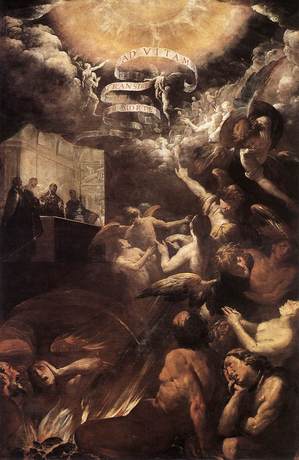- The five areas a good school of theology needs to be attentive to: sacred Scripture, sacred Liturgy, patristic study, dogmatic study and ethics. I fully believe that Prosper of Aquataine is correct, and ought to orient all study of theology: legem credendi lex statuat supplicandi. In shorthand, the law of prayer is the law of belief.
Theology: November 2012 Archives
 My neighbor has several fig trees. His children are now in the process of wrapping them up for the winter --New England is not an agreeable place to raise fig trees all year.
My neighbor has several fig trees. His children are now in the process of wrapping them up for the winter --New England is not an agreeable place to raise fig trees all year.The front page of today's New Haven Register carried an article by Jordan Fenster, "Right-to-die bill may be discussed by legislature" by which the citizens of Connecticut were alerted to the possibility that in the next session of the legislature the question of assisted suicide will be on the table. Following the defeat of Massachusetts ballot on the same subject last week, the contagion is now again flowing south. Already three US states, Oregon, Montana and Washington, allow for physician assisted suicide. 34 states prohibit lethal doses of medication that would end human life.
Let me say from the outset, this is not a Catholic issue. Persons of belief and unbelief ought to be concerned about the potential passing of a law that legalizes medically induced suicide. Hence, this is not a conservative issue. This is not a an anti-human dignity issue. It is just the opposite: this is a human issue. Who we are a human beings, and how we teach each other is a human issue that is informed by what we believe and how we behave. Committing this legislative error is a problem of education. Recall that in the past when a similar bill was brought to the CT voters it failed only 51-49%.
Several weeks ago there appeared in the New York Times an intriguing OP-ED article that I believe we need to seriously consider in the discussion of physician assisted suicide. Considering voices that differ from ours need to be thoughtfully taken into account because we are people use who reason to frame our moral lives. We can't simply dismiss the other and therefore I appeal to people of belief and unbelief to reasonably discuss what's at stake. When we rush the discuss without fact we always get burned.
In my opinion not enough attention has been devoted to considering how this legislation has been lived out in this country and in others, nor have we considered the philosophical, theological, sociological and human consequences of such an act. Most often our heart-strings are pulled, even stretched leading us to decide weighty matters without due attention to the reality in front of us --to the person and people and intimately connected with life and death issues. We also don't always adequately consider the eternal consequences of killing someone before natural death happens.
Who's life are we "making dignified" by engaging death before it's naturally presented? What really is human dignity? What does it mean to be truly a man or a woman in relationship with other men and women here-and-now, and following death? To what extent does fear, anxiety and perceived suffering dictate how we think and act toward others? Are we sufficiently aware of and sensitive to the difference between ideology and being a person, no matter how debilitated?
Here is Ben Mattlin's October 31, 2012 New York Times article published online.
The USCCB President Timothy Cardinal Dolan began his address saying that we need to attend to "First things first: we are first believers in Christ: the way, the truth and the life...We need to recall that the Lord said, "Seek first the Kingdom of God": it is God who first engages us..."

The month of November is the Month of the Holy Souls in Purgatory. I was thinking after a funeral celebrated earlier today for a friend, Jack, who died last Saturday, about my on-going responsibility for the souls in purgatory. This after being reminded that I am called, as are all the baptized, to be an echo of the encounter with Christ in this world, but also in eternal life. What I do here and now has a direct consequence in the later in the promised Destiny with the Savior.
Is it a matter of saying the Lord's Prayer, Hail Mary and the Glory Be with the Eternal Rest prayers around the time of a person's death, or only on the anniversary of death of a loved one or friend? Somehow I doubt it.
The
law of charity that I think Christians are called to live with certainty makes
a claim on us to pray for the dead and dedicate some portion of prayer, fasting
and almsgiving for the Church Suffering (the Holy Souls) so that one day they
become part of the Church Triumphant. Being Friends in the Lord (disciples of
Christ) can't be indifferent to those who have died. We believe that the bonds
of love don't unravel with the death of the body. We promise the dying that we
won't forget them. If this is true, then why do we so often forget to have a
Mass offered for their intentions, or say a rosary for our loved ones, or
absent ourselves from visiting the cemetery? Mass, the rosary and a visit are
concrete acts of love that have a real consequence for real people we knew and
loved in this life.
Consider the image of posted above is a example of spiritual works effecting the soul of another. Here the Baroque Master Giovanni Battista Crespi, "Il Cerano" (1573-1632) paints in 1617 Saint Gregory the Great "delivering the soul of a monk." The deliverance is the result of the monk and pope Gregory offering Mass for the soul of a monk. The depths of mercy and love are mined by the devotion of the Mass for another.

